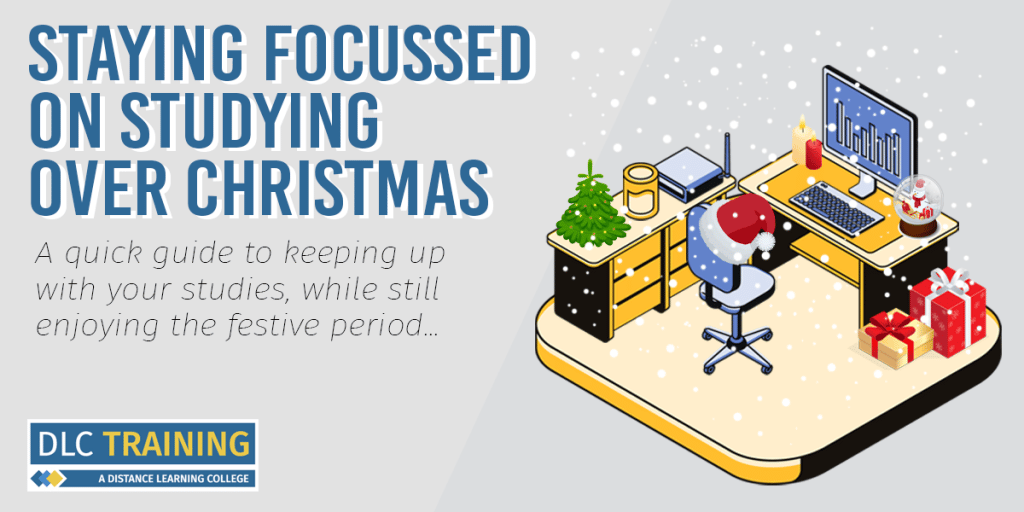Studying in your spare time is a relatively easy task when you have a routine in place. But then all of a sudden Christmas creeps around the corner and throws your routine (and good intentions!) straight out of the window.

A combination of Christmas parties, plans with friends and families, shopping for gifts, and the general preparations for Christmas day can make the idea of fitting in some serious study time seem impossible. Our tips below will show you how to keep up with your studies over the Christmas period without having to miss out on any of the festivities.
How Can I Study Over Christmas?
There are 5 key things that you can do to make sure you fit in as much study time as possible and make each of your study sessions as productive as possible. This includes:
- Make a plan to study
- Plan your breaks
- Declutter your workspace
- Get in the zone
- Try focus techniques
Make a plan to study
The first and probably most important thing to do is to make a plan. Work out how many days off work you have over the Christmas period and what you are doing on each of those days. You’ll notice some days are quieter than others, so you could allocate some study time on those days. If possible, study during the optimal hours of learning for our circadian rhythms (our body clocks), which are 10am-2pm and 4pm-10pm. You do not need to study every day, in fact, we would encourage you not to. Make sure you enjoy the festive period, after all, the big man only comes once a year!
Plan your breaks
Planning breaks into studying may seem counter-productive, but without them, you won’t get through as much studying as you think. A recent study on employee work habits found that those who took a break after around 1 hour of working were more productive during working time than their counterparts who did not.
Be sure to schedule your breaks before you begin studying so that you don’t start to feel demotivated by waiting too long. It’s important to avoid using screens as much as possible during breaks (including your phone). You need to come back from your break feeling refocused and re-energised, and scrolling on a phone does not have this effect. The study break ideas guide provides examples of what to do on your breaks to help you recharge and refocus, so that when you come back to your studies you’re raring to go.
Declutter your workspace
The more clutter we have in our surroundings, the more discontent we feel. This statement is true in most situations, including when we study. A recent study found that people who felt overwhelmed by the number of things in their homes were significantly more likely to procrastinate than those who didn’t; therefore if your workspace is cluttered, you are much more likely to procrastinate than if it was uncluttered. Try to put away anything you don’t need while you’re studying so there is nothing to distract you from the task at hand.
Get in the zone
It can be difficult to get into the swing of studying at Christmas, so it is beneficial to try and mentally prepare beforehand to get in the zone. You can do this in a number of ways, including getting a good night’s sleep the night before; eating a healthy meal before you start studying; and exercising (a fair amount to get your blood pumping). All of these activities will increase your energy levels, and get you in the right frame of mind to sit and concentrate for longer periods of time.
Try focus techniques
As well as preparing yourself before you begin studying, there are also ways to help improve your focus and concentration levels during your study time, so you aren’t sitting blankly at your desk waiting for the clock hands to move. Consider using a time-management technique to help you to be as productive as possible.